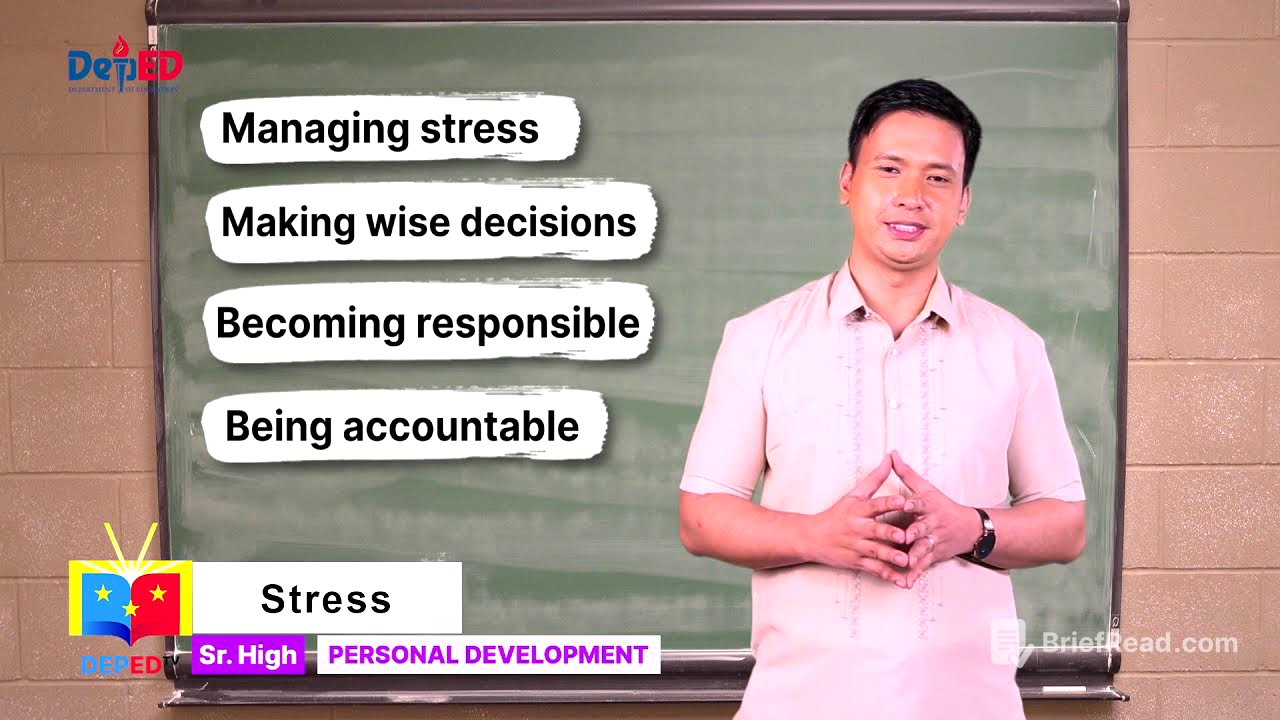TLDR;
This video discusses the importance of responsibility in adolescence as a preparation for adulthood, covering key aspects such as understanding responsibility, setting priorities, managing stress, and nurturing mental health. It emphasizes the roles of trust, accountability, and the impact of responsible behavior on the community. The video also explores strategies for managing stress and making wise decisions, highlighting the importance of self-awareness and positive mindset.
- Responsibility is crucial for adolescents, involving trust and accountability.
- Setting priorities and managing time effectively reduces stress and earns respect.
- Avoiding excuses and taking ownership of actions are key to responsible behavior.
- Managing stress and nurturing mental health are essential for overall well-being.
- Positive mindset and continuous self-development contribute to personal growth.
Introduction to Responsibility [1:32]
Taking responsibility is a fundamental aspect of daily life, instilled from a young age through parental training. This training aims to equip individuals with the skills to handle future tasks and challenges, fostering a sense of duty as both individuals and community members. The episode focuses on guiding adolescents to become responsible individuals, preparing them for adulthood, and promoting an understanding of mental health and psychological well-being.
Understanding Responsibility [2:54]
Responsibility is defined as a moral, legal, or mental obligation entrusted to an individual, for which they are held accountable for any resulting consequences. Key components of responsibility include trust and accountability. Earning the trust of others involves accepting and succeeding in challenges, leading to accountability for one's actions. Being a responsible adolescent involves living harmoniously with others, stepping up to fulfill duties, setting priorities, managing time effectively, and honoring commitments, which reduces stress and earns respect.
Impact of Responsibility on the Community [4:17]
Becoming a responsible person involves performing duties and accountabilities, which can significantly impact the community. A person known for their sense of responsibility gains positive feedback from peers and colleagues, creating a ripple effect. Such individuals serve as role models, and their way of living becomes worthy of emulation, leading to positive transformation within the society.
Obligations of a Responsible Adolescent [5:01]
Before becoming a fully responsible adult, adolescents must understand the established norms and standards of responsible behavior. Common obligations include showing respect for elders, caring for younger siblings, studying diligently, avoiding vices, establishing a positive identity, earning trust, distinguishing between good and bad influences, and understanding oneself better. These obligations prepare adolescents for their future lives.
Establishing a Sense of Responsibility [6:39]
Establishing responsibility involves several key steps. First, it's crucial to know your priorities by reflecting on what is most important and making decisions to prioritize those things. Identifying goals and purposes is essential for direction. Setting priorities leads to decisiveness and reduces procrastination, encouraging wise use of time. Second, avoid making excuses, blaming others, or complaining. Responsible individuals make the right choices, especially in difficult situations, adopting a victor mentality rather than a victim mentality. They address issues constructively and seek solutions. Third, punctuality and consistency are vital, with the principle that "early is on time, on time is late, and late is unacceptable." Punctuality demonstrates respect, responsibility, and trustworthiness. Fourth, learn to organize and manage your life by creating systems to track tasks and goals, using to-do lists and planners. Managing finances, even with a limited allowance, is also important, involving budgeting, saving, and investing. Fifth, take responsibility for your thoughts, feelings, and actions, managing emotions like anger and jealousy by avoiding comparison. Control your responses to others, communicate openly, and choose happiness in the present moment.
Dealing with Stress [12:03]
Adolescents face various issues that can lead to stress, including challenges with friends, family, academics, relationships, and pressure. Coping with stress varies from person to person, necessitating self-assessment to determine the most effective strategies. Stress is a condition characterized by physical or emotional tension and is a natural response to feeling threatened or worried. Stress can be positive, such as excitement for an upcoming event, or negative, such as dealing with loss. Stressors are demanding or threatening events that cause stress, leading to biological and behavioral responses.
Models and Views of Stress [14:18]
There are three main views of stress: stress as stimulus, stress as response, and stress as relational. Stress as stimulus refers to demanding or threatening events like exams or projects. Stress as response emphasizes the physiological responses to demanding situations. Stress as relational focuses on the relationship between the person and the environment, where stress results from assessing whether personal resources are sufficient to meet demands. Severe stress can be harmful, leading to feeling overwhelmed and out of control. Strong emotions are normal if temporary and not interfering with daily activities.
Managing Stress and Making Wise Decisions [15:49]
Managing stress, making wise decisions, and being responsible are crucial traits, especially for adolescents. This is the time to develop values, virtues, and essential qualities to prepare for adulthood. Change your mindset to view challenges as opportunities. A quote from Paulo Coelho advises against living to please others, emphasizing the importance of doing one's best out of love and service. Be kind, humble, and choose not to let situations cause stress. Treat difficulties as temporary challenges for growth.









